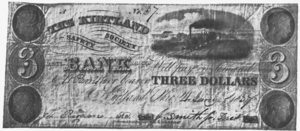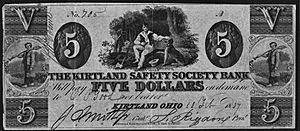Kirtland Safety Society facts for kids
The Kirtland Safety Society (KSS) was first proposed as a bank in 1836, and eventually organized on January 2, 1837, as a joint stock company, by leaders and followers of the Church of the Latter Day Saints. According to KSS's 1837 "Articles of Agreement", it was intended to serve the financial needs of the growing Latter Day Saint community in Kirtland, Ohio. Its preamble stated it was:
... for the promotion of our temporal interests, and for the better management of our different occupations, which consist in agriculture, mechanical arts, and merchandising.
However, by November 1837, KSS failed and its business closed. In the aftermath, Joseph Smith, founder of the Latter Day Saint movement, was fined for "running an illegal bank," though he was employed as the institution's Cashier. While Smith appealed the fine and made arrangements to have Oliver Granger settle the affairs of the quasi-bank, many financially harmed Latter Day Saints left the church because they believed Smith had established the institution in order to enrich himself and church leadership.
Economy in Kirtland
By late 1836, many recent Latter Day Saint converts had gathered in Missouri and Kirtland, Ohio. The city of Kirtland experienced a significant population increase, growing from approximately 1,000 people in 1830 to 3,000 in 1836, with a similar increase in surrounding agricultural areas. The population growth was at least partially responsible for a rapid increase in land prices between 1832 and 1837. The average price per acre of land sold in Kirtland rose from approximately $7 in 1832 to $44 in 1837, only to fall back to $17.50 in 1839. (Ludlow, p. 283) Generalized inflation during the period accounted for between 25 and 40 percent of the price increase. Although the church held considerable real estate, estimated at approximately $60,000 in equity by historian Larry T. Wimmer, it also needed liquidity to repay outstanding loans. The credit needs of the church, growing population and ongoing land transactions required a local bank. Banks in the United States in the period before the Civil War issued and often backed their own currency.
KSS organization
After some discussion by the leadership of the Church, church apostle Orson Hyde went to the Ohio legislature to request a bank charter while Oliver Cowdery went to Philadelphia and acquired plates to print notes for the proposed Kirtland Safety Society bank. On January 2, Hyde returned to Kirtland empty-handed. He had been unable to persuade any legislator to sponsor a bill giving KSS a bank charter. Church president and founder Joseph Smith attributed the lack of sponsorship to disfavor toward the Mormons.
Hyde returned to the Ohio legislature in February with a petition, joined by several non-Mormons, for a bank based on far less capital stock. This time Hyde secured legislative sponsors, and the request was added as an amendment to another bill. However, the bill was defeated by the Ohio legislature. Grandison Newell, a professed antagonist to the Latter Day Saints in general and its president in particular, instigated several lawsuits against the Mormons in Ohio. Newell was close to three legislators who had taken the charter requests under consideration and used his influence to dissuade them.
Although this rejection has been attributed to both political and religious differences, this Ohio legislature was much more restrictive in issuing bank charters than the previous legislative body. The legislature was now dominated by the hard money wing of the Democratic party, the "Jacksonian Democrats". Due to their influence, the legislature refused all applications for bank charters but one during 1836 and 1837, in part because of endemic nationwide problems with land speculation, wildcat banking and counterfeiting.
Under the advice of non-Mormon legal counsel, the Kirtland Safety Society Anti-Banking Company (KSSABC) was formed under revised articles on January 2, 1837 as a joint stock company to serve as a quasi-banking institution. Quasi-banks operated as banks (sometimes in conjunction with other business activities) although they had no formal bank charter. These corporate institutions were not uncommon in Ohio at the time as banking regulations were limited. Whigs went so far as to encourage businesses to operate as quasi-banks. Even after the national bank failure in 1837, there was no widespread opposition to quasi-banks in Ohio until 1873.
"Anti" and "ing" were engraved before and after "Bank"—in smaller typeface—on the printing plates Cowdery had previously purchased in Philadelphia. Subscribers and organizers of the KSSABC were members of the Kirtland community (merchants, farmers, etc.), many of whom became shareholders of the company. Sidney Rigdon served as the KSSABC's chairman and president, Warren Parrish as signatory, secretary and teller; Joseph Smith was cashier. Supporters hoped that they would eventually be able to secure a formal banking charter. In the interim, the KSSABC began issuing notes as a quasi-bank in early January 1837.
The proposed capitalization of the "anti-bank" greatly exceeded the resources that were available from its backers, as noted by historian, Robert Kent Fielding:
As it was projected, there was never the slightest chance that the Kirtland Safety Society anti-Bank-ing Company could succeed. Even though their economy was in jeopardy, it could scarcely have suffered such a devastating blow as that which they were themselves preparing to administer to it. ... The Safety Society proposed no modest project befitting its relative worth and ability to pay. Its organizers launched, instead, a gigantic company capitalized at four million dollars, when the entire capitalization of all the banks in the state of Ohio was only nine and one third million. Such presumption could not have escaped the notice of bankers who would have been led to examine its capital structure more closely. ... according to the articles of incorporation capital stock was to be paid in by subscription but that the amount of payments were left to the discretion of the company managers. Furthermore, total issuance of notes was not prescribed, nor was the relation of notes to capital and assets. The members, to be sure, pledged themselves to redeem the notes and bound themselves individually by their agreement under the penal sum of one hundred thousand dollars. But there was no transfer of property deeds, no power of attorney, no legal pains and penalties. To a banker, the articles fairly shouted: 'this is a wildcat, beware!'
National bank crisis
The KSS failure, although unique in some ways, was part of a national bank crisis known as the Panic of 1837 that began in May of that year. Underlying causes of the nationwide financial panic included speculative and inflationary selling of public lands in western states like Michigan, Ohio and Missouri. The economic policies of the previous President Andrew Jackson, including the Specie Circular and the withdrawal of government funds from the Second Bank of the United States, also contributed to the crisis.
On May 10, 1837 in New York, every chartered bank stopped payment in specie (gold and silver coinage), leaving banks and local institutions like the KSS holding notes without adequate liquid assets. Within two months the failures in New York alone aggregated nearly $100,000,000 in value. "Out of eight hundred and fifty banks in the United States, three hundred and forty-three closed entirely, sixty-two failed partially, and the system of State banks received a shock from which it never fully recovered." Smaller, privately held financial institutions, like the KSS, also failed in droves. The Panic was followed by a five-year depression, characterized by ongoing failures of banks and financial institutions and record unemployment levels.
Opposition and failure
In February 1837, at the behest of Newell, Samuel D. Rounds swore a writ against Smith and Rigdon for illegal banking and issuing unauthorized bank paper. At a hearing in March, this trial was postponed until autumn. Eventually Rounds voluntarily dropped all of the cases in his suit except those against Smith and Rigdon. Although Smith's only official capacity for KSSABC was cashier, other officers and parties with equal or greater responsibility were absolved from the suit. KSSABC continued issuing notes through June, but eventually failed due to insolvency, as most of the KSSABC reserves were tied up in land rather than silver as some erroneously believed.
Smith transferred all of his holdings to Oliver Granger and J. Carter in June and resigned from the KSSABC in July. Parrish and Frederick G. Williams assumed management of the KSSABC until the institution closed its doors in November with about $100,000 in unresolved debt. Smith appointed Granger as his agent to clear up his Kirtland affairs, as Smith was named in seventeen lawsuits with claims totalling $30,206.44 over debts incurred in the failure of the KSSABC. According to LDS Church scholars, "Four of these suits were settled; three were voluntarily discontinued by the plaintiffs; and ten resulted in judgments against Joseph Smith and others. Of these ten judgments, three were satisfied in full, three were satisfied in part, and only four were wholly unsatisfied." The church also raised and put up $38,000 in bail money for Smith at the Geauga County Court which was to be held to satisfy any judgment that might be rendered against Smith.
On July 28, Smith, Rigdon and Thomas B. Marsh headed to Upper Canada on church business and returned in late August. On September 27, Smith and Rigdon departed Kirtland for Missouri. They arrived about one month later, spent about two weeks in Missouri on Church business and returned to Kirtland on December 10. In their absence, in October, they were fined $1,000 for operating an illegal bank. According to Dale W. Adams, professor of agricultural economics at Ohio State University, other, larger quasi-banks had been operating in Ohio longer than KSSABC and were not being prosecuted.
Among KSSABC's misfortunes, Smith also accused Parrish of embezzling $25,000 from KSSABC. In June Smith sought a search warrant to confirm the allegations against Parrish but was denied.



